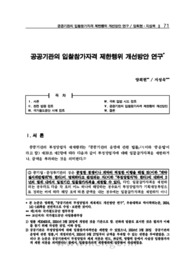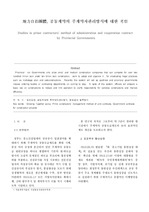

PARTNER
검증된 파트너 제휴사 자료
공공기관의 입찰참가자격 제한행위 개선방안 연구 (A Study on Improvement for Restrictive Practices in Public Institutions' Bidding Eligibility)
26 페이지
최초등록일 2025.03.17
최종저작일
2025.01

-
미리보기
서지정보
· 발행기관 : 경상국립대학교 법학연구소
· 수록지 정보 : 법학연구 / 33권 / 1호 / 71 ~ 96페이지
· 저자명 : 양희현, 지성욱
초록
본 논문은 공공기관의 입찰참가자격 제한행위가 재량행위이어야 하는지 기속행위이어야 하는지를 검토하였다. 이러한 사항은 공공기관이 법령의 위임과 준용이라는 복잡한 입찰참가자격 제한체계에 놓여 있기 때문에 발생하는 것이다. 지금까지 입찰참가자격 제한제도나 재량행위 및 기속행위에 대한 개별적인 연구는 많이 진행되었다. 그러나 공공기관이 입찰참가자격을 제한할 경우 재량행위로 볼 것인지, 기속행위로 볼 것인지에 대해 공공기관의 구체적인 사례나 국회의 입법 시도를 근거로 검토한 연구는 찾아보기 어려웠다.
공공기관에서 입찰참가자격 제한행위의 근간이 되는 「공공기관의 운영에 관한 법률」(이하 '공운법') 제39조 제3항에서, 이와 관련한 사항을 「공기업․준정부기관 계약사무규칙」(이하 '계약사무규칙')에 위임하고 있다. 계약사무규칙 제15조는 「국가를 당사자로 하는 계약에 관한 법률」(이하 '국가계약법') 제27조에 따라 입찰참가자격을 제한하도록 되어 있다. 그런데 공운법과 계약사무규칙에는 부정당업자에 대해 "입찰참가자격을 제한할 수 있다"고 되어 있는 반면, 국가계약법에는 "입찰 참가자격을 제한하여야" 한다고 되어 있다. 즉, 계약질서 위반행위라는 동일한 행위를 두고, 공운법과 계약사무규칙은 재량행위로, 국가계약법은 기속행위로 규정되어 있다. 그렇다면, 공공기관은 부정당업자에 대해 입찰참가자격을 제한할 경우 재량행위로 할지, 기속행위로 할지에 대해 혼선이 발생할 수 있다.
국가철도공단(이하 '공단')에서 2024년에 개최된 계약심의위원회에서 기업은 공단에게 입찰참가자격 제한행위의 재량권 행사를 요청하였다. 또한, 공단은 공공기관의 입찰참가자격 제한행위가 재량행위인지 기속행위인지 확인하기 위해 2곳의 법무법인에 법률자문을 의뢰했던 사례가 있다. 2곳의 법무법인은 공통적으로 공공기관의 입찰참가자격 제한행위는 기속행위가 적정하다고 회신하였다. 그런데 이와 반대되는 의견도 존재한다. 즉, 공공기관의 입찰참가자격 제한행위에 대해서 전문가의 의견이 일치하지 않고 있다.
21대 국회와 22대 국회는 공운법을 개정하기 위한 입법을 세 차례 시도하였다. 이는 공운법의 입찰참가자격 제한행위를 재량행위에서 기속행위로 변경하는 것이었다. 21대 국회에서 제출된 공운법 개정안은 임기만료로 폐기되었다. 그리고 22대 국회에서 제출된 공운법 개정안은 현재 국회 기획재정위원회에 상정된 상태이다.
본 논문은 다음과 같은 3가지 점에서 공공기관의 입찰참가자격 제한행위를 기속행위로 변경하는 것이 합리적이라고 판단하였다. 첫째, 입찰참가자격 제한행위와 관련하여, 중앙부처와 지자체는 기속행위로 규정되어 있고, 공공기관은 재량행위로 규정되어 있다. 따라서 공공입찰을 시행하는 발주청의 형평성을 확보하는 것이 필요하다. 둘째, 재량행위를 기속행위로 전환시키거나 재량권의 범위를 축소하여 행정의 예측 가능성을 제고하는 것이 법치주의에 부합한다. 셋째, 공공기관에게 재량권이 부여되더라도 현실적으로 공공기관은 감사 수감, 언론 보도 등을 감안하여 재량권을 활용하지 않을 확률이 높다. 이에 따라 본 논문은 공운법과 계약사무규칙의 입찰참가자격 제한행위를 기속행위로 개정하되, 공정성과 투명성을 확보할 수 있도록 계약심의위원회 설치에 관한 조항을 신설하는 것이 타당하다고 검토하였다.영어초록
This paper examines whether the restriction of bidding eligibility by public institutions should be a discretionary act or a mandatory act. This issue arises because public institutions are subject to a complex system of bidding eligibility restrictions delegated and applied by law. While there have been many individual studies on the bidding eligibility restriction system, discretionary acts, and mandatory acts, it is difficult to find research that examines whether public institutions' restrictions on bidding eligibility should be viewed as discretionary or mandatory acts, based on specific cases of public institutions or legislative attempts by the National Assembly.
Article 39, Paragraph 3 of the Act on the Management of Public Institutions (hereinafter referred to as the "Public Institutions Act"), which forms the basis for the restriction of bidding eligibility by public institutions, delegates related matters to the Rules on Contract Affairs of Public Enterprises and Quasi-Governmental Institutions (hereinafter referred to as the "Contract Affairs Rules"). Article 15 of the Contract Affairs Rules stipulates that bidding eligibility should be restricted in accordance with Article 27 of the Act on Contracts to Which the State is a Party (hereinafter referred to as the "State Contracts Act"). However, while the Public Institutions Act and the Contract Affairs Rules state that bidding eligibility "may be restricted" for fraudulent contractors, the State Contracts Act states that bidding eligibility "shall be restricted." In other words, for the same act of violating contract order, the Public Institutions Act and the Contract Affairs Rules define it as a discretionary act, while the State Contracts Act defines it as a mandatory act. Therefore, public institutions may be confused about whether to treat the restriction of bidding eligibility as a discretionary or mandatory act.
In 2024, at the Contract Review Committee held by the Korea National Railway (hereinafter referred to as the "KR"), there was a case where a company requested the KR to exercise its discretion in restricting bidding eligibility. Additionally, the KR sought legal advice from two law firms to confirm whether the restriction of bidding eligibility by public institutions is a discretionary or mandatory act. Both law firms responded that it is appropriate for the restriction of bidding eligibility by public institutions to be a mandatory act. However, there are also opposing opinions. In other words, experts do not agree on whether the restriction of bidding eligibility by public institutions should be a discretionary or mandatory act.
The 21st and 22nd National Assemblies attempted to amend the Public Institutions Act three times to change the restriction of bidding eligibility from a discretionary act to a mandatory act. The amendment bill submitted by the 21st National Assembly was discarded due to the expiration of its term. The amendment bill submitted by the 22nd National Assembly is currently pending in the Planning and Finance Committee of the National Assembly.
This paper concludes that it is reasonable to change the restriction of bidding eligibility by public institutions to a mandatory act for the following three reasons. First, regarding the restriction of bidding eligibility, central ministries and local governments are regulated as mandatory acts, while public institutions are regulated as discretionary acts. Therefore, it is necessary to ensure fairness among the contracting authorities implementing public bids. Second, converting discretionary acts to mandatory acts or reducing the scope of discretion enhances the predictability of administration, which is in line with the rule of law. Third, even if public institutions are granted discretion, they are unlikely to exercise it in practice, considering internal and external audits and the media. Accordingly, this paper suggests that it is appropriate to amend the Public Institutions Act and the Contract Affairs Rules to mandatory acts, while also establishing provisions for the installation of a Contract Review Committee to ensure fairness and transparency.참고자료
· 없음태그
-
자주묻는질문의 답변을 확인해 주세요

꼭 알아주세요
-
자료의 정보 및 내용의 진실성에 대하여 해피캠퍼스는 보증하지 않으며, 해당 정보 및 게시물 저작권과 기타 법적 책임은 자료 등록자에게 있습니다.
자료 및 게시물 내용의 불법적 이용, 무단 전재∙배포는 금지되어 있습니다.
저작권침해, 명예훼손 등 분쟁 요소 발견 시 고객센터의 저작권침해 신고센터를 이용해 주시기 바랍니다. -
해피캠퍼스는 구매자와 판매자 모두가 만족하는 서비스가 되도록 노력하고 있으며, 아래의 4가지 자료환불 조건을 꼭 확인해주시기 바랍니다.
파일오류 중복자료 저작권 없음 설명과 실제 내용 불일치 파일의 다운로드가 제대로 되지 않거나 파일형식에 맞는 프로그램으로 정상 작동하지 않는 경우 다른 자료와 70% 이상 내용이 일치하는 경우 (중복임을 확인할 수 있는 근거 필요함) 인터넷의 다른 사이트, 연구기관, 학교, 서적 등의 자료를 도용한 경우 자료의 설명과 실제 자료의 내용이 일치하지 않는 경우
“법학연구”의 다른 논문도 확인해 보세요!
-
해사법원 설립과 해양안전심판원의 활용방안에 관한 연구 25 페이지
그동안 우리는 조선업과 해운 물류로 대변되는 바다의 하드웨어 부분에서는 큰 성취를 이루었으나, 그 기반이 되는 해양정책이나 관련 법체계 등 소프트웨어 부분에는 그다지 관심을 기울이지 않았다. 아무리 우주와 AI, 가상 인터넷 공간이 중요해진다고 한들 육지와 쌍벽을 이루는 바다라는 광대한 물리적 공간은 우리 현실의 삶에서 절대적 부분이다. 이러한 바다에서 발.. -
국제상사법원과 재판부 구성의 다양화 24 페이지
국가 간 무역이 증대되면서 국제상사분쟁의 수와 규모는 나날이 증가하고 있다. 국제상사분쟁을 적절히 해결하기 위해서는 국제상사분쟁의 특성에 맞는 적절한 분쟁해결수단이 마련되어야 한다. 국제상사분쟁의 전형적인 해결수단으로 활용되는 것은 국제상사중재이나, 최근 그 대안으로 국제상사법원이 등장하고 있다. 국제상사법원은 여러 국가에서 이미 설립되었거나 설립이 진행되.. -
网络主播劳动法律关系的认定研究 19 페이지
随着网络主播产业的迅速发展,涌现出众多平台、主播、工作室以及相关从业人员,直播业务的迅速发展不断衍生新的问题,这一领域的用工劳动关系如何认定产生了很大争议。在传统的雇佣模式中,劳动关系的确立通常基于三个核心标准:雇主与雇员的法律资格、雇员对雇主的人身及经济依赖性,以及工作与企业业务的关联程度。然而,网络主播用工模式已经超越了传统雇佣关系中对工作时间和工作场所的严格界定,展现出一种更为灵活、互动和多.. -
공익적 언사와개인정보보호법 26 페이지
사회가 복잡해지면서 자신에 대한 정보를 기업이나 정부에 제공해야만 생활과 행복추 구에 긴요한 서비스를 받을 수 있는 경우가 늘어나고 있다. 개인정보보호법은, 서비스제 공자와 힘의 비대칭에 놓여 자신에 대한 정보의 향후 이용이나 제3자제공을 미리 제한할 협상력이 없는 정보주체를 ‘정보감시’ 또는 정보감시의 위험으로부터 오는 ‘위축효과’로부 터 보호하기 위해 ..
찾으시던 자료가 아닌가요?
지금 보는 자료와 연관되어 있어요!
문서 초안을 생성해주는 EasyAI


